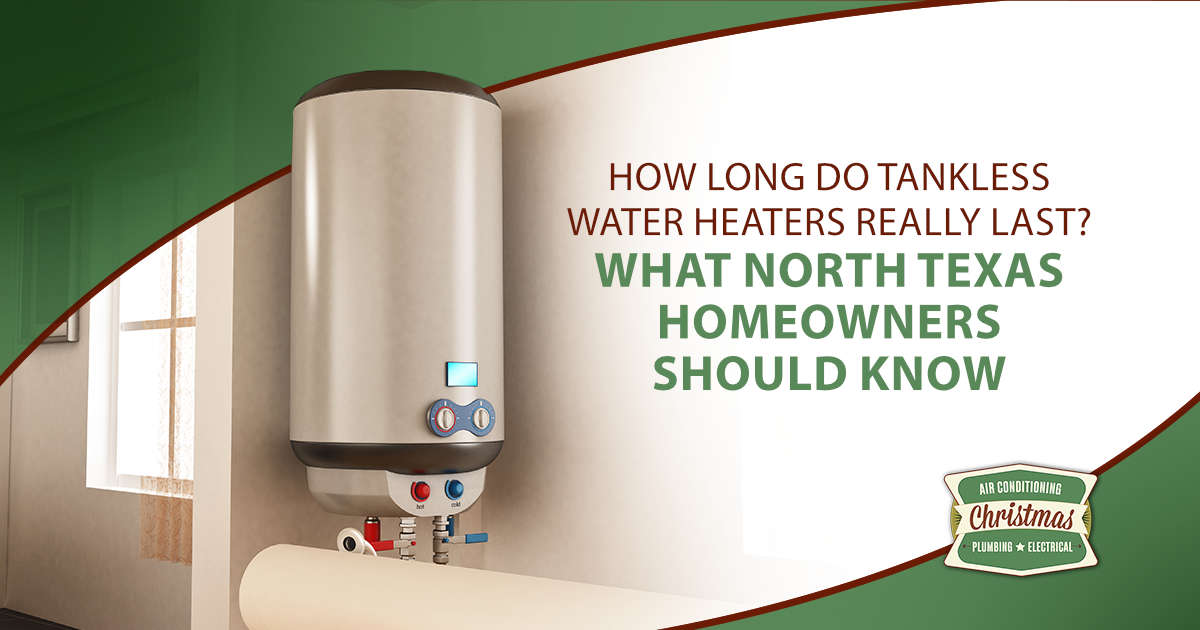Tankless water heaters have become increasingly popular among homeowners in Denton and the Dallas-Fort Worth area. These systems provide hot water on demand and are more energy-efficient than traditional tank water heaters. Understanding the lifespan of a tankless water heater is important for homeowners considering a new installation or evaluating whether an existing system needs replacement. Factors such as water quality, usage, installation, and regular maintenance all influence how long a tankless water heater will function efficiently.
Understanding the Average Lifespan of Tankless Water Heaters
Tankless water heaters are designed to last longer than traditional storage tank systems. On average, a well-maintained tankless water heater can last 15 to 20 years or more, making it a long-term investment for homeowners. Several factors influence the lifespan of these systems, including usage, water hardness, brand quality, and routine maintenance.
Key Factors Affecting Lifespan
- Usage and Demand: Homes with high hot water demand or multiple bathrooms may experience faster wear on the system. Frequent use can place more strain on the heating elements.
- Water Quality: North Texas water is naturally hard, which can lead to mineral buildup inside the system. Hard water without proper treatment can reduce the life of a tankless water heater.
- Brand and Model: Higher-quality tankless systems often have durable components and longer warranties. Choosing a reputable brand can improve long-term performance and reliability.
Importance of Installation and Maintenance
Proper installation is essential to maximize a tankless water heater’s lifespan. Incorrect sizing, poor venting, or improper connection of gas and water lines can reduce efficiency and cause early failure. Routine maintenance, such as annual flushing or descaling, is particularly important in areas with hard water like Denton and surrounding North Texas communities. Regular inspections by a licensed plumber help identify potential issues before they lead to costly repairs or premature replacement.
How Proper Maintenance Extends Your Tankless System’s Life
Routine maintenance plays a crucial role in extending the life of a tankless water heater. North Texas homeowners, in particular, must pay attention to hard water issues, which can lead to mineral buildup and reduce efficiency. Regular service ensures the system operates safely and efficiently, preventing unexpected breakdowns.
Flushing and Descaling in Hard Water Areas
- Annual Flushing: Flushing the tankless system once or twice a year removes scale and sediment. This process helps maintain consistent water temperature and efficient operation.
- Descaling Treatments: Professional descaling removes mineral buildup from the heating elements. This prevents clogs and prolongs the life of the water heater.
- Water Softening Solutions: Installing a whole-house water softener can reduce scale accumulation. This protects the system and improves performance over time.
Professional Inspections
Regular inspections by a licensed plumber ensure that all components of the tankless water heater are functioning correctly. Professionals can detect leaks, corrosion, or other issues that may go unnoticed by homeowners. Addressing small problems early prevents costly repairs and extends the system’s lifespan.
Routine Maintenance Checklist
- Check for leaks in water and gas lines
- Inspect venting and combustion systems
- Test temperature and pressure settings for efficiency
Signs Your Tankless Water Heater May Be Aging or Failing
Even with proper maintenance, tankless water heaters can show signs of aging after many years of use. Recognizing these warning signs helps homeowners plan for replacement or service before a complete system failure occurs.
Common Warning Signs
- Inconsistent Water Temperature: Fluctuating hot water during showers or appliance use may indicate failing heating elements.
- Reduced Flow or Pressure: Decreased water flow often signals internal blockages or mineral buildup.
- Strange Noises or Error Codes: Popping, rumbling, or repeated error codes on the unit indicate mechanical stress or potential failure.
Frequent Repairs
If homeowners find themselves repeatedly calling a plumber for minor repairs, it may be more cost-effective to replace the system. Continuous maintenance costs can outweigh the investment in a new, efficient tankless water heater.
Preparing for Replacement
- Evaluate the system’s age and frequency of repairs
- Compare energy efficiency and cost savings of new units
- Schedule consultation with a licensed professional for replacement options
Long-Term Value and Reliability for Homeowners
Tankless water heaters offer long-term value for families planning to stay in their homes. Their extended lifespan reduces the need for frequent replacements, saving homeowners money over time. The energy efficiency of tankless systems also contributes to lower utility bills, making them a cost-effective choice.
Modern tankless systems provide a reliable supply of hot water whenever it is needed. Homeowners no longer need to worry about running out of hot water during peak usage times. Consistent performance makes these systems ideal for busy households with multiple bathrooms and appliances.
Investing in a tankless water heater increases home value. Prospective buyers often view energy-efficient upgrades as desirable features. This reliability can make homes more attractive on the market and improve long-term resale potential.
Environmental and Energy Benefits
Tankless water heaters consume less energy than traditional storage tanks. They heat water only when it is needed, reducing wasted energy. This efficiency also lowers household utility bills and provides measurable savings.
Reduced energy consumption contributes to a smaller environmental footprint. Using less energy helps decrease greenhouse gas emissions over time. Homeowners can enjoy comfort while supporting sustainable practices.
Many North Texas homes experience hard water, which increases energy demands in older systems. Tankless water heaters paired with water softeners operate more efficiently and last longer. Properly maintained systems reduce both environmental impact and operating costs.
Factors That Influence Tankless Water Heater Performance
Several factors can affect how well a tankless water heater performs over time. Water quality, including hardness and sediment levels, directly impacts the efficiency of the heating elements. Homes in North Texas often require additional maintenance to address mineral buildup and protect system components.
Usage patterns also influence performance and lifespan. High-demand households with multiple bathrooms or frequent appliances place more stress on the system. Over time, this can reduce efficiency if maintenance is not performed regularly.
The quality of installation plays a significant role in system performance. Incorrect sizing, poor venting, or improper connections can cause operational issues. Professional installation ensures that the water heater works efficiently and reliably for many years.
Ready to Upgrade or Maintain Your Tankless Water Heater?
North Texas homeowners in Denton and the Dallas-Fort Worth area can trust Christmas Air Conditioning and Plumbing for all tankless water heater needs. Schedule professional installation, replacement, or routine maintenance with licensed plumbers who ensure your system operates efficiently and lasts longer. Call now: 469-919-9928 & schedule online using the contact form at Christmas Air Conditioning and Plumbing.
Get expert tankless water heater services today and enjoy reliable hot water for years to come. Don’t wait for costly repairs—secure your system’s efficiency and longevity now.

